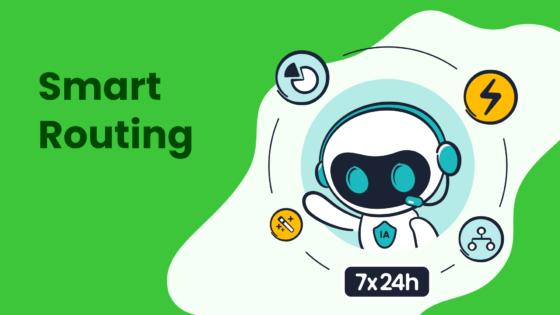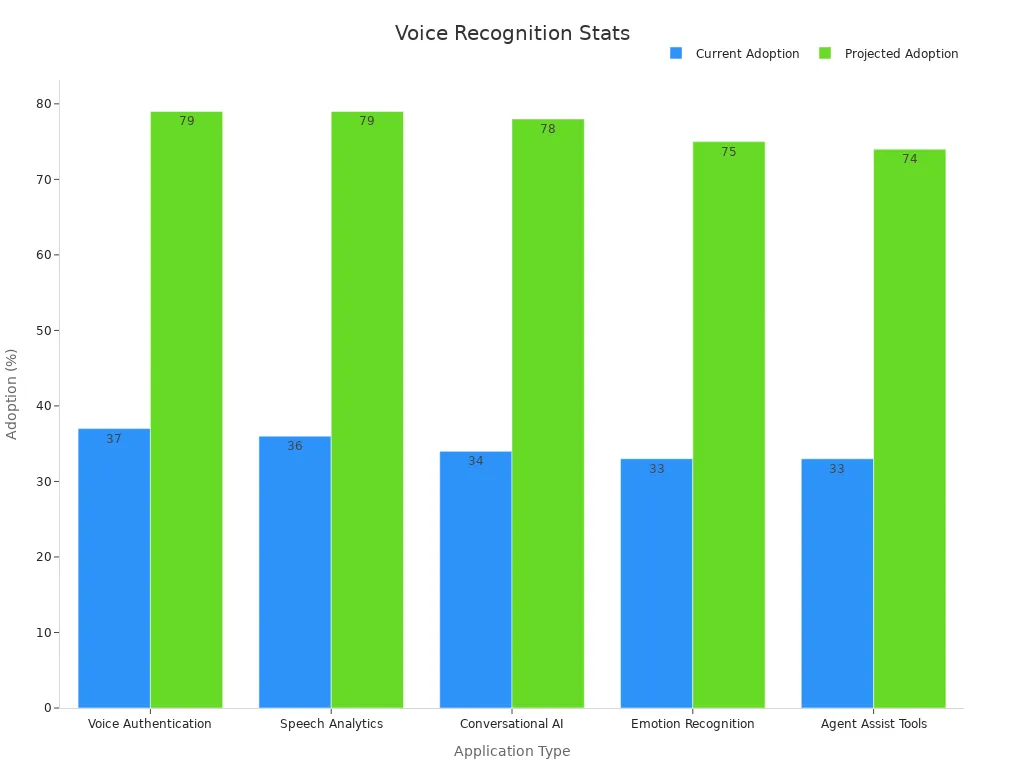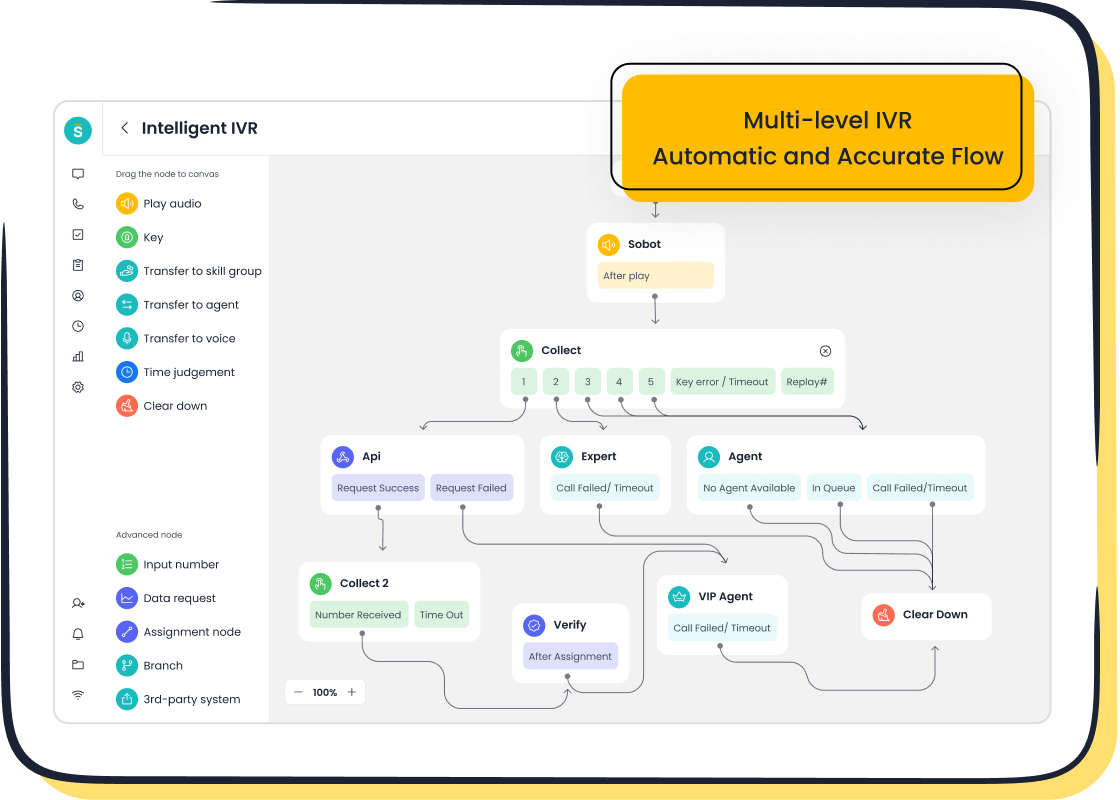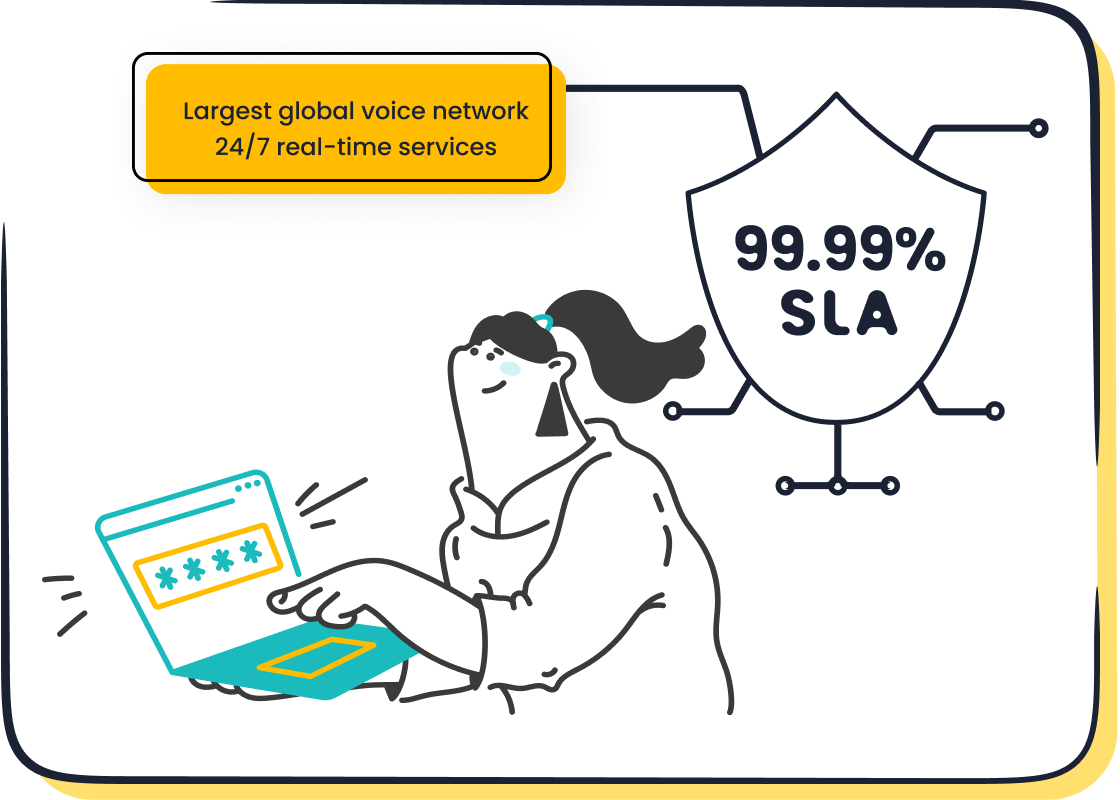The Role of AI in Modern Call Center Operations

Artificial intelligence (AI) has revolutionized how businesses approach customer service. By automating repetitive tasks and analyzing vast amounts of data, AI enhances both efficiency and customer satisfaction. In the context of AI call centers, its impact is undeniable. For instance, 95% of companies using AI report reduced costs and time savings, while 92% believe generative AI improves service quality. As businesses increasingly adopt AI, with 42% of contact centers planning integration by 2025, solutions like Sobot's AI-powered tools are leading the way in transforming customer interactions.
Core AI Technologies Driving AI Call Centers

Natural Language Processing (NLP) in Customer Interactions
Natural Language Processing (NLP) plays a vital role in improving how you interact with customers. It enables AI systems to understand and respond to human language, making conversations more natural and effective. With NLP, call center AI can analyze customer messages to detect emotions, provide real-time assistance to agents, and even summarize conversations for better insights.
For example, sentiment analysis helps identify the emotional tone of a customer’s message, allowing you to respond empathetically. Real-time assistance ensures agents receive prompts and suggestions during calls, improving accuracy and reducing response times. Automated summarization further enhances customer satisfaction by identifying common issues across channels.
| Metric | Description |
|---|---|
| Sentiment Analysis | Detects emotional tone of customer messages, allowing for empathetic responses. |
| Real-time Assistance | Provides agents with prompts and suggestions during calls, improving response accuracy. |
| Automated Summarization | Analyzes feedback from various channels to identify common issues and enhance customer satisfaction. |
| Performance Tracking | Monitors response time, resolution rates, and customer satisfaction to identify areas for improvement. |
Machine Learning for Predictive Analytics
Machine learning (ML) empowers call centers to predict customer needs and optimize operations. By analyzing historical data, ML identifies patterns and trends, enabling you to anticipate customer behavior. This predictive capability helps reduce handle times and improve agent training.
For instance, AI insights derived from ML allow you to manage requests more efficiently. Supervisors can provide precise feedback to agents, boosting productivity by 18%. Additionally, businesses using AI in call centers have reduced handle times by up to 40%, streamlining operations and cutting costs.
| Evidence Description | Impact on Call Center Operations |
|---|---|
| Agent productivity improved by 18% due to precise feedback from supervisors. | Enhances efficiency and effectiveness of agents. |
| AI insights help manage requests efficiently and improve agent training. | Fosters customer loyalty and strengthens business assets. |
| Customers who feel heard are more likely to remain loyal. | Increases customer retention and satisfaction. |
| Call center analytics market projected to grow to $1.4 billion. | Indicates rising importance of analytics in operations. |
| Businesses reduced handle times by up to 40% through performance analysis. | Streamlines operations and reduces costs. |
Voice Recognition and Speech Analytics in Call Centers
Voice recognition and speech analytics transform how you handle customer calls. These technologies enable AI to transcribe conversations, analyze speech patterns, and even recognize emotions. This ensures more personalized and efficient interactions.
Adoption rates for these tools are rapidly increasing. For example, voice authentication and speech analytics are projected to grow from 37% and 36% adoption today to 79% by the near future. Similarly, conversational AI and emotion recognition are expected to see significant growth.

These advancements allow you to deliver better customer experiences while improving operational efficiency. By integrating voice recognition, you can automate processes, reduce errors, and enhance agent performance.
Benefits of AI in Call Centers
Enhanced Efficiency and Productivity with AI
AI automation transforms how you manage call center operations. By automating routine tasks, such as call routing and data entry, AI allows agents to focus on complex customer issues. This shift not only improves productivity but also enhances job satisfaction. For example, AI tools provide real-time feedback and continuous monitoring, enabling agents to refine their performance.
Studies show that businesses using AI in call centers experience significant gains. According to Harvard Business Review, productivity increases range from 20% to 35%, while Salesforce reports a 38% boost in efficiency. AI also reduces average handling time by 43%, as noted by Twilio AI, streamlining operations and improving customer satisfaction.
| Source | Improvement Metrics |
|---|---|
| Harvard Business Review | Productivity increases of 20-35% and higher job satisfaction rates |
| Twilio AI | 43% reduction in average handling time and 12 percentage points improvement in CSAT |
| Salesforce | Productivity increases of up to 38% and lead conversion improvements of 21% |
By integrating AI-powered customer service tools like Sobot's Cloud Call Center, you can achieve these results. Its intelligent IVR and AI-powered voicebot automate workflows, ensuring seamless operations and better outcomes.
Personalized Customer Experiences Through AI
AI applications in customer service enable you to deliver personalized interactions that resonate with your audience. By analyzing customer data, AI tailors responses and recommendations to individual preferences. This approach fosters an enhanced customer experience, building loyalty and trust.
Statistics highlight the importance of personalization. Over 54% of consumers feel more favorable toward brands that use personalized advertising. Companies focusing on customer experience management are three times more likely to achieve their goals than competitors. AI-driven tools, such as Sobot's unified workspace, consolidate customer data across channels, enabling agents to provide consistent and personalized support.
For instance, Sobot's AI copilots assist agents by generating tailored responses and summaries, ensuring every interaction feels unique. This level of personalization not only improves customer satisfaction but also drives repeat business, as seen in OPPO's 57% increase in repurchase rates after implementing Sobot's solutions.
Cost Savings and Resource Optimization
AI automation in call centers significantly reduces operational costs. By automating routine inquiries, AI minimizes staffing needs and optimizes resource allocation. This efficiency translates into long-term financial benefits, including higher ROI and reduced overhead.
| Aspect | Description |
|---|---|
| Operational Costs | AI reduces costs by automating routine inquiries and minimizing staffing needs. |
| Customer Satisfaction | Enhanced service delivery through AI increases customer satisfaction and loyalty. |
| Long-term Financial Impact | AI integration offers long-term ROI and financial optimization. |

AI also improves key performance metrics like Average Handling Time (AHT) and First Call Resolution (FCR). Shorter AHT saves costs, while higher FCR rates indicate efficient query handling. For example, AI phone calls achieve 3.8 times the contact rate at 40% lower costs. Sobot's Cloud Call Center exemplifies this efficiency with features like bulk outbound tasks and smart call routing, ensuring optimal resource utilization.
By adopting AI-powered customer service solutions, you can enhance operational efficiency, reduce costs, and improve customer satisfaction. These benefits make AI an indispensable tool for modern call center automation.
24/7 Customer Support Availability
Providing round-the-clock customer service is no longer a luxury; it’s a necessity. Customers expect immediate assistance, regardless of the time or day. AI-powered customer service makes this possible by ensuring your call center operates 24/7 without interruptions. Unlike human agents, AI systems don’t require breaks or shifts, allowing you to deliver consistent support at all hours.
AI tools like chatbots and voicebots handle inquiries instantly, reducing wait times and improving customer satisfaction. For example, Sobot’s AI-powered voicebot offers intelligent interaction and intent recognition, ensuring customers receive accurate responses even during peak hours. This capability not only enhances the customer experience but also reduces the workload on your human agents.
The advantages of 24/7 availability extend beyond convenience. It helps you capture opportunities that might otherwise be missed. Imagine a customer needing urgent assistance late at night. With AI, your call center can address their concerns immediately, fostering trust and loyalty. Businesses using AI in call centers report higher customer retention rates, proving the value of uninterrupted support.
Improved Data Insights for Better Decision-Making
AI doesn’t just automate tasks; it transforms how you make decisions. By analyzing vast amounts of data in real time, AI systems provide actionable insights that improve call center operations. These insights help you identify trends, predict customer needs, and optimize strategies.
For instance, AI-enhanced KPI automation allows you to monitor key metrics like response times and resolution rates. Real-time data analysis ensures you can adapt quickly to changing customer demands. Predictive modeling anticipates future needs, enabling you to stay ahead of the curve. Machine learning algorithms further enhance decision-making by tailoring agent training based on performance data.
| Metric/Insight | Description |
|---|---|
| Real-Time Data Analysis | Enables immediate insights into customer interactions, allowing for timely decision-making. |
| Predictive Modeling | Anticipates customer needs, improving service delivery and operational efficiency. |
| Machine Learning Algorithms | Enhances the ability to analyze data and improve agent performance through tailored training. |

Sobot’s Cloud Call Center exemplifies these benefits. Its monitoring and analysis tools provide detailed reports, helping you refine your operations. By using AI in call centers, you can make informed decisions that enhance customer satisfaction and operational efficiency.
AI agents also process data rapidly and accurately, ensuring you can adjust strategies as needed. This capability leads to better customer experiences and higher retention rates. The benefits of AI in call centers go beyond automation; they empower you to make smarter, faster decisions that drive success.
Challenges of Implementing AI in Call Centers
Data Privacy and Security Concerns
When deploying AI in call centers, data privacy and security often emerge as significant challenges. AI systems process vast amounts of sensitive customer data, including personal and financial information. This creates a pressing need for robust security measures to prevent breaches and unauthorized access.
For example, many businesses struggle to comply with data protection regulations like GDPR or CCPA. Non-compliance can lead to hefty fines and damage to your reputation. Additionally, the rise of AI automation increases the risk of cyberattacks, as hackers target systems with valuable customer data.
To address these concerns, you must prioritize secure AI implementation. Solutions like Sobot's Cloud Call Center ensure encrypted data transfer and GDPR compliance, offering peace of mind. By adopting such secure platforms, you can protect customer information while leveraging AI's benefits.
| Challenge | Description |
|---|---|
| Data privacy and security concerns | The rise of AI brings significant concerns regarding the protection of sensitive customer data. |
| Limited visibility into agent performance | Call centers struggle to monitor and evaluate agent performance effectively. |
| Scalability issues with manual QA processes | Manual quality assurance processes are not scalable, leading to inefficiencies. |
Integration Challenges with Existing Systems
Integrating AI with your existing call center systems can be a complex process. Legacy systems often lack the flexibility to support modern AI tools, leading to compatibility issues. This can delay implementation and increase costs.
For instance, many call centers face difficulties when trying to merge AI solutions with their CRM platforms or communication channels. Without seamless integration, you risk data silos and operational inefficiencies. A 2022 study from PwC revealed that 43% of workers worry about being replaced by employees who can use AI tools better, highlighting the need for proper training during integration.

Sobot simplifies this process with its AI-powered solutions. Its Cloud Call Center offers seamless integration with CRM systems, ensuring a smooth transition. By choosing scalable and flexible AI platforms, you can overcome these challenges and unlock the full potential of AI in your operations.
Balancing Automation with Human Interaction
AI automation can streamline processes, but it’s essential to maintain a balance between automation and human interaction. Customers still value the human touch, especially for complex or emotional issues.
A study comparing customer satisfaction rates found that automation improves response times and self-service management. However, tasks like changing delivery data or resolving disputes benefit from human involvement. This balance ensures that your call center delivers both efficiency and empathy.
Sobot’s AI solutions, such as its AI copilots, help you achieve this balance. These tools assist agents by generating responses and summaries, allowing them to focus on building meaningful connections with customers. By combining AI automation with human expertise, you can enhance customer service while maintaining a personal touch.
High Initial Investment Costs
Implementing AI in your call center often requires a significant upfront investment. This includes costs for purchasing AI tools, upgrading infrastructure, and integrating new systems. For many businesses, these expenses can seem daunting, especially when combined with the need for ongoing maintenance and updates. However, understanding the long-term benefits can help you justify these initial costs.
AI automation reduces operational expenses over time by streamlining processes and improving efficiency. For example, Sobot’s Cloud Call Center offers a cost-effective SaaS rental model, which eliminates the need for expensive hardware. Its features, such as intelligent IVR and AI-powered voicebots, automate repetitive tasks, saving both time and money. Businesses that adopt AI often see a reduction in average handling time and an increase in first-call resolution rates, which directly impacts customer satisfaction.
To overcome challenges related to high costs, you can start small by implementing AI in specific areas of your call center. Gradually expanding its use allows you to manage expenses while experiencing the benefits of AI. Additionally, choosing scalable solutions like Sobot ensures that your investment grows with your business needs.
Tip: Focus on the return on investment (ROI) rather than the upfront costs. AI tools not only enhance customer service but also improve operational efficiency, leading to long-term savings.
Training and Change Management for Staff
Introducing AI into your call center requires more than just technology—it demands a shift in how your team operates. Training and change management are critical to ensure your staff can effectively use AI tools and adapt to new workflows. Without proper preparation, employees may feel overwhelmed or resistant to change.
Studies show that 67% of employees believe AI will impact their roles, while 66% feel they need skill upgrades to adapt. However, only 27% think they require significant training. This highlights the importance of clear communication and comprehensive training programs. You can use methods like Force Field Analysis to identify factors that support or resist AI adoption. By addressing these factors, you can create a smoother transition for your team.
Sobot’s AI solutions, such as its AI copilots, are designed to enhance human capabilities rather than replace them. These tools assist agents by generating responses and summaries, making their jobs easier and more efficient. To maximize the benefits, you should emphasize education and highlight how AI complements your team’s skills. A phased implementation approach, supported by continuous training, ensures your staff feels confident and empowered.
Note: Successful AI integration depends on careful planning and ongoing support. By investing in your team’s development, you can overcome challenges and unlock the full potential of AI in customer service.
Best Practices for Implementing AI in Call Centers
Setting Clear Objectives and Use Cases
Before implementing AI in your call center, you need to define clear objectives and use cases. This step ensures that your AI tools align with your business goals and deliver measurable results. For example, you might aim to reduce call handle times or improve first-call resolution rates. These objectives provide a roadmap for your AI integration journey.
To track progress, establish measurable KPIs like customer satisfaction scores or average handling time. Regularly monitor these metrics to evaluate the effectiveness of your AI implementation. Continuous performance optimization is also essential. By refining AI models based on real-time feedback, you can ensure they meet your evolving needs.
| Framework/Metric | Description |
|---|---|
| Clear Objectives | Establish specific goals for AI integration, such as reducing call handle times or improving first-call resolution. |
| Measurable KPIs | Use metrics like customer satisfaction scores and average handling time to track progress and ROI. |
| Continuous Performance Optimization | Monitor KPIs in real-time and refine AI models based on feedback to ensure alignment with business needs. |
| AI-driven Metrics Standardization | Organizes performance metrics to ensure consistent evaluation across departments, enhancing clarity and accountability. |
Ensuring Compliance with Data Protection Regulations
Deploying AI in call centers requires strict adherence to data protection regulations. AI systems process sensitive customer data, making compliance a top priority. Automated compliance monitoring can help track adherence across all interactions, reducing manual effort. Real-time violation alerts ensure immediate action when issues arise.
The evolving regulatory landscape, including laws like TCPA and HIPAA, demands vigilance. Non-compliance can result in fines exceeding £1,500 per infraction. Proactive measures, such as monitoring lead behavior and using multiple communication channels, build trust while ensuring compliance.
- 92% of contact center agents report having quality assurance programs in place, reflecting a strong commitment to compliance.
- Quality scoring automation and regulatory update tracking keep your team informed and prepared for changes.
By integrating compliance-focused features like those in Sobot’s Cloud Call Center, you can protect customer data and maintain trust.
Investing in Scalable and Flexible AI Solutions
Scalability is crucial when implementing AI in your call center. Cloud-based AI platforms allow you to handle fluctuating call volumes efficiently. During peak times, you can scale up operations, and during off-peak periods, you can scale down to save resources.
Rapid advancements in AI technologies, such as machine learning and NLP, enhance the accuracy of customer interactions. Automation streamlines operations, enabling you to manage high inquiry volumes without increasing staff. For example, Sobot’s Cloud Call Center combines automation with NLP to create a scalable and efficient business model.
| Key Insights | Description |
|---|---|
| Scalability | Cloud solutions allow organizations to efficiently handle fluctuating call volumes. |
| Technological Advancements | Rapid advancements in AI technologies enhance the accuracy and relevance of customer interactions. |
| Operational Efficiency | Automation and NLP integration streamline operations, enabling call centers to manage high inquiry volumes. |
Investing in scalable AI solutions ensures your call center can adapt to changing demands while maintaining high performance. Flexible platforms like Sobot’s Cloud Call Center provide the tools you need to grow your operations seamlessly.
Training Employees for AI Integration
Training your employees for AI integration is essential to ensure a smooth transition and maximize the benefits of automation. Proper training equips your team with the skills needed to use AI tools effectively, boosting both confidence and productivity. A well-structured training program focuses on real-time learning, performance tracking, and continuous improvement.
To enhance training outcomes, you can leverage AI-driven tools that provide actionable insights. These tools analyze performance data to identify strengths and weaknesses, enabling you to tailor training programs to individual needs. For example:
- AI-driven performance training analytics help pinpoint areas where agents excel or need improvement.
- Real-time feedback mechanisms allow agents to refine their skills during live calls.
- Data analytics for training effectiveness ensure that your training programs remain impactful by assessing their success and making necessary adjustments.
By integrating these methods, you can create a dynamic learning environment that evolves with your team’s needs. Sobot’s AI copilots, for instance, assist agents by generating responses and summaries, making their tasks easier and more efficient. This approach not only enhances employee performance but also ensures that your call center delivers exceptional customer service.
Monitoring and Continuously Improving AI Performance
Monitoring AI performance is crucial for maintaining high standards in your call center. AI-powered tools simplify this process by providing precise data and actionable insights. These tools help you track key metrics, identify trends, and make informed decisions to optimize operations.
To ensure continuous improvement, follow these steps:
- Automate performance evaluations using AI to gather real-time data.
- Identify training needs based on insights from performance metrics.
- Align training programs with customer expectations to enhance service quality.
Key metrics to monitor include:
| Key Metrics | Description |
|---|---|
| Call Handling Time | Measures the average duration of calls handled by agents. |
| Customer Satisfaction Scores | Reflects customer feedback on their interaction experience. |
| Resolution Rates | Indicates the percentage of issues resolved on the first call. |
Blending quantitative data with qualitative insights allows you to understand performance trends better. For example, Sobot’s Cloud Call Center provides real-time monitoring and analysis tools, enabling you to refine your strategies continuously. By implementing AI effectively and focusing on these best practices for implementing AI in call centers, you can ensure long-term success and customer satisfaction.
Future Trends in AI Call Centers

AI-Powered Chatbots and Virtual Assistants
AI-powered chatbots and virtual assistants are transforming how you manage customer interactions. These tools provide continuous service, handling inquiries, resolving issues, and processing transactions without requiring human agents. This ensures your call center operates efficiently, even during off-hours.
Adoption rates for these technologies are skyrocketing. Currently, 89% of contact centers use AI for digital chatbots, and the market value is projected to grow from $5.1 billion in 2023 to $36.3 billion by 2032, with a CAGR of 24.4%. This growth reflects the increasing reliance on AI automation to enhance customer service.
| Statistic | Value |
|---|---|
| C-level executives believing AI enhances team success | 61% |
| Support agents sharing the same sentiment | 45% |
| Contact centers using AI for digital chatbots | 89% |
By integrating AI-powered chatbots, you can reduce wait times, improve resolution rates, and ensure customer satisfaction. These tools not only streamline operations but also allow your team to focus on more complex tasks.
Emotion Recognition and Sentiment Analysis
Emotion recognition is reshaping how you connect with customers. AI systems now assess and respond to emotions in real time, enabling empathetic interactions. For example, these tools analyze voice tone, word choice, and speech patterns to detect frustration or satisfaction. This allows your agents to adjust their approach and provide better support.
Future advancements will make these systems even more sophisticated. They will interpret complex emotional states, helping agents deliver responses that resonate with customers. Emotion AI also aids in training by showing agents how to handle emotionally charged situations effectively. This trend ensures your call center remains both efficient and customer-focused.
- AI enables real-time emotion assessment, improving customer interactions.
- Predictive analytics helps forecast peak call times and common issues, reducing operational costs by 20% and improving efficiency by 15%.
Hyper-Personalization Through Advanced Analytics
Hyper-personalization is the next frontier in customer service. By leveraging real-time data, AI creates tailored interactions that reflect individual preferences. This approach strengthens relationships and builds trust.
AI algorithms analyze customer behavior to deliver precision-targeted responses. For instance, chatbots provide personalized assistance, while real-time analytics platforms adjust strategies instantly. Interactive CRM systems further enhance this by offering insights for customized agent responses.
- Real-time data processing ensures immediate insights.
- Predictive analytics identifies potential issues before they escalate.
- Personalized interactions improve customer satisfaction and loyalty.
By adopting hyper-personalization, you can transform your call center into a customer-centric powerhouse. This trend not only enhances experiences but also drives long-term success.
Integration of AI with Omnichannel Support
Integrating AI with omnichannel support transforms how you manage customer interactions. It ensures seamless communication across multiple platforms, including voice, chat, email, and social media. This integration allows you to provide consistent service, regardless of the channel your customers choose.
AI automation plays a key role in this process. It unifies data from various sources, giving your agents a complete view of customer history. This helps them deliver faster and more personalized responses. For example, when a customer switches from live chat to a phone call, AI ensures the conversation continues without interruptions.
The benefits of combining AI with omnichannel support are significant. Businesses report improved efficiency, reduced costs, and higher customer satisfaction. Metrics show that efficiency increases by 3.46 times, while total cost of ownership drops by 37.6%. Customer satisfaction scores rise by 22.4%, and average handle time decreases by 38.6%.
| Metric | Result |
|---|---|
| Efficiency | Boosted by 3.46X |
| Cost Savings | TCO reduced by 37.6% |
| Customer Satisfaction (CSAT) | Increased by 22.4% |
| Average Handle Time | Dropped by 38.6% |

By adopting AI-powered omnichannel solutions like Sobot’s Cloud Call Center, you can achieve these results. Its unified workspace consolidates customer data, enabling agents to provide consistent and efficient service across all channels. This integration not only enhances customer experiences but also streamlines your operations.
Generative AI in Customer Interactions
Generative AI is revolutionizing customer interactions in call centers. It uses advanced algorithms to create human-like responses, making conversations more engaging and effective. This technology enables you to handle complex inquiries with ease, improving both resolution rates and customer satisfaction.
Generative AI excels in creating tailored responses based on customer data. For instance, it can analyze past interactions to suggest solutions that align with individual preferences. This personalization fosters trust and loyalty, encouraging repeat business.
AI automation also enhances your team’s productivity. Generative AI assists agents by drafting responses, summarizing conversations, and even predicting customer needs. These capabilities reduce average handle time and allow your agents to focus on building stronger connections with customers.
Adopting generative AI tools like Sobot’s AI copilots ensures your call center stays ahead of the curve. These tools empower your agents to deliver exceptional service while maintaining efficiency. By leveraging generative AI, you can transform your call center into a hub of innovation and customer satisfaction.
AI has transformed call center operations by enhancing efficiency, reducing costs, and improving customer satisfaction. However, challenges like data privacy, integration issues, and training requirements demand careful planning. Balancing AI with human agents ensures a personal touch remains in customer service. For example, focusing AI on web chat while reserving phone calls for human agents creates a strategic balance. Seamless escalation processes and transparent communication further improve the customer experience.
AI-powered customer service tools like Sobot’s Cloud Call Center exemplify this balance. They combine automation with human expertise, empowering agents to handle complex queries empathetically. As AI continues to evolve, its potential to revolutionize customer support grows. By adopting innovative solutions, you can deliver exceptional service and shape the future of customer interactions.
FAQ
What is the role of AI in a call center?
AI enhances call center operations by automating repetitive tasks, analyzing customer data, and providing real-time assistance. It improves efficiency, reduces costs, and ensures better customer experiences. AI tools like chatbots and voicebots handle inquiries instantly, allowing agents to focus on complex issues.
How does AI improve customer satisfaction in call centers?
AI personalizes customer interactions by analyzing data and tailoring responses. It provides instant support, reducing wait times and resolving issues faster. Tools like sentiment analysis help agents respond empathetically, ensuring a positive experience for customers.
Can AI replace human agents in a call center?
AI complements human agents rather than replacing them. It handles routine tasks, while agents focus on complex or emotional issues. This balance ensures efficiency and maintains the personal touch customers value in call center interactions.
What are the cost benefits of using AI in call centers?
AI reduces operational costs by automating tasks and optimizing resource allocation. It lowers average handling times and increases first-call resolution rates. These efficiencies lead to long-term savings and higher ROI for businesses.
How does AI ensure data security in call centers?
AI systems use encryption and compliance measures to protect sensitive customer data. Platforms like Sobot’s Cloud Call Center adhere to regulations like GDPR, ensuring secure data handling and building customer trust.
See Also
Evaluating Artificial Intelligence Solutions For Business Call Centers
Comprehensive Overview Of AI Software For Call Centers
Best Ten AI Applications For Business Contact Center Needs
Understanding The Efficiency Of Call Center Automation
Exploring The Technology Behind Voice Analytics In Call Centers
